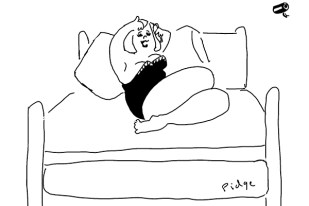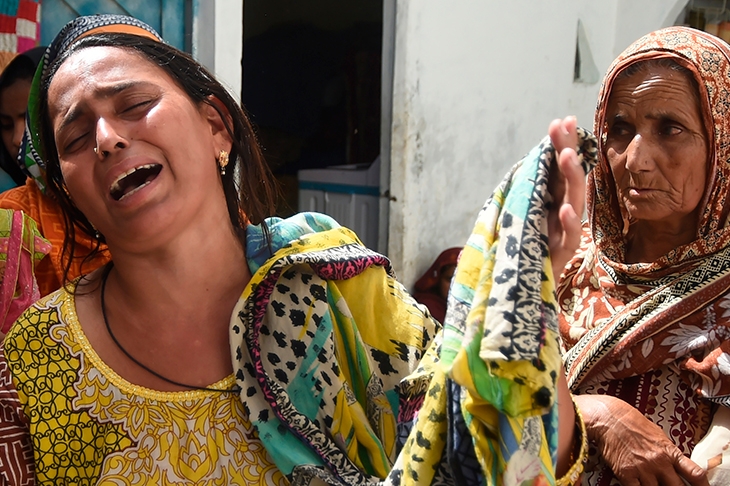Karachi, Pakistan’s troubled heart, is known to cast a seductive spell over residents and visitors alike. In Karachi Vice, the award-winning journalist Samira Shackle writes that the city’s penchant for extremity and eccentricity kept luring her back from London for almost a decade. During these visits, made between 2012 and 2019, she navigates the darkest corners of the metropolis’s maze and documents some of the lives that exist on the peripheries of society.
In a city where violence is constantly simmering beneath the surface and lines between law enforcement and crime are blurred, locals develop their own mechanisms for coping with trauma. For instance, Safdar, an ambulance driver who survived a suicide bombing at a religious procession and a gun battle at the airport, continues to go about his business despite the risks. When asked how he copes, he tells Shackle that he doesn’t think about it much, adding: ‘Memories are a prison.’
Yet memory serves an important function in this work of literary nonfiction, where Shackle vividly reconstructs the past experiences of her subjects by immersing herself in their daily lives, languages and customs, without exoticising the experience. She notices that Safdar’s speech takes on a respectful tone when he converses in Pashto, his native tongue, but exudes the cockiness of a Karachiite when he switches to colloquial Urdu.

Shackle describes Lyari, one of the oldest and most dangerous neighbourhoods of the city, as ‘a geographically contained trauma’. Parveen, one of its young denizens, is shocked to find that amid the garbage-lined alleys, the home of the gangster Uzair Baloch is, by contrast, palatial, with a swimming pool, waterfall and giant, ornate swing, all incorporated within the lobby, and where the echoes of screams can be heard from a nearby torture chamber. When Parveen’s mother learns of the scolding that she gave Uzair during the visit to his lair, she refuses to get out of bed for days.
This contrast between extremes is a defining characteristic of life in Karachi, one of the largest cities in the world. Shackle notes that the office of the country’s leading news channel, Geo, is done up flamboyantly from the inside, while its elevator and immediate environs are run-down. She observes that the country’s media isn’t the best at imposing ethical standards. The police often manipulate it to make themselves look dutiful, while political parties and gangsters use it to build their images and gain an edge over rivals. Zille, one of the reporters whom Shackle shadows, had never read a newspaper before he became a journalist and stumbled into the role accidentally. He prides himself on his connections to criminal overlords such as Uzair Baloch, whom he describes as being well-mannered, cultivated and quiet.
In the palatial lobby of Uzair Baloch’s home the echoes of screams can be heard from a nearby torture chamber
At the very edge of the city lies the remote desert settlement of Lal Baksh Kachehlo, the residents of which are all related to one another through inter-family marriages. Some of them, such as Jannat, a girl whom Shackle interviews, have never seen a computer before, let alone the political representatives of the area. The villagers have of late begun to notice changes to their environment. The silence of the night, punctuated by the howls of jackals, has been replaced by a distant humming of machines. When the women venture into the desert to collect firewood, they see unfamiliar men staring at them. Even the air has started to smell different, the dust laced with a strange chemical. According to Shafi Muhammad, the village elder, the police had never visited the place in the 60 years he has been alive — until they arrived with bulldozers to raze their homes. Locals are told that the land on which they have lived for generations now belongs to Bahria Town, a vast housing development being built on the outskirts of Karachi.
Shackle lived in Karachi for the year 2012-3, when she stayed with an aunt and her spiteful pet parrot. Subsequent trips, involving riskier reporting, were made in secret, without the knowledge of her relatives. On such occasions, she was put up at a guest house, which she later learnt had its share of dubious characters.
One of her trips coincided with the paramilitary’s raid on Nine Zero, the headquarters of the Muttahida Qaumi Movement (MQM) — a political party known to strike terror into the hearts of Karachiites. The rangers conducted the raid wearing ski masks, so as to avoid being directly targeted by the party — a testament to the sort of tactics it can resort to. That time, Shackle was staying at an elite, private members’ club. When she learned of the raid and asked the receptionist to order her a taxi to Nine Zero he laughed at her.
Shackle believes that understanding Karachi is key to understanding the country. In The Nine Lives of Pakistan, Declan Walsh, a New York Times correspondent was expelled from the country under a cloud of mystery, describes Pakistan as a land of contradictions.
When Walsh visits the late Baloch chief, Nawab Akbar Bugti, a stalwart of an outdated tribal order, who defends honour killings and orders rocket attacks on gas refineries, he is surprised to see him teaching his tribesmen to read poetry and write essays in English — a regular practice at his court. Bugti, who operates a private jail, has three wives, once had a Swedish mistress and is an ardent protector of Hindus and Sikhs, who have, under his watch, lived peacefully in his ancestral village for generations. He has little time for religion and tells Walsh: ‘God should be a loving God; he must love and respect, not punish.’
Walsh’s westernised friends in Pakistan resent the way the country is portrayed in the foreign press as a haven for terrorists. They urge him to paint a balanced picture, taking into account what they believe to be the real Pakistan: that is, the party scene, the alcohol consumption, the fashion shows, the beauty of the northern areas and memories of a more enlightened era. Yet Walsh dismisses this as yet another cliché, arguing that ‘nostalgia and denial could not mask the cruel, ugly and downright terrifying side of Pakistan’, where minorities and a large number of women lead a precarious existence.
Similarly, when Karachiites boast about their resilience — the city’s ability to bounce back from a deluge or a Taleban attack — Walsh questions whether this is something to be proud of: ‘Karachiites seemed to be making a virtue of necessity, glossing over the realities of their chaotic, cruel city.’ Nine Lives contains a shocking number of typos, but this does not detract from the brilliance of Walsh’s insights and — like Shackle — his ability to pick up on the details that locals may be oblivious of.






Comments